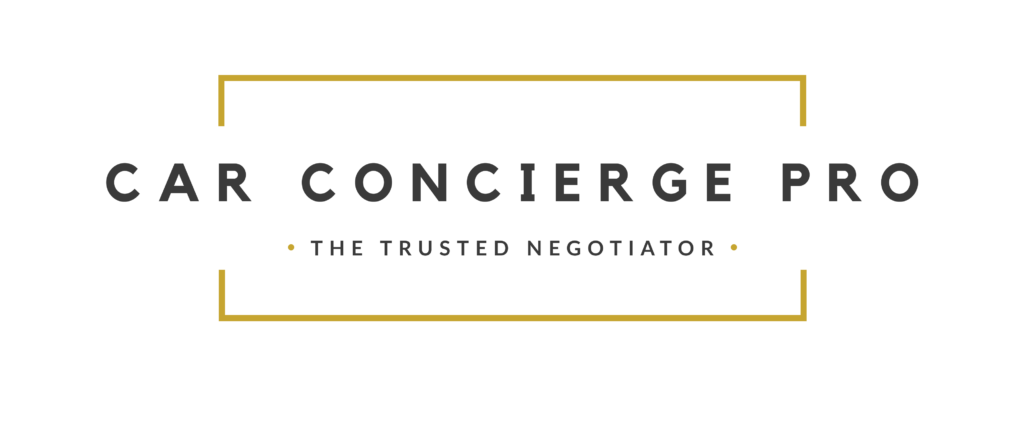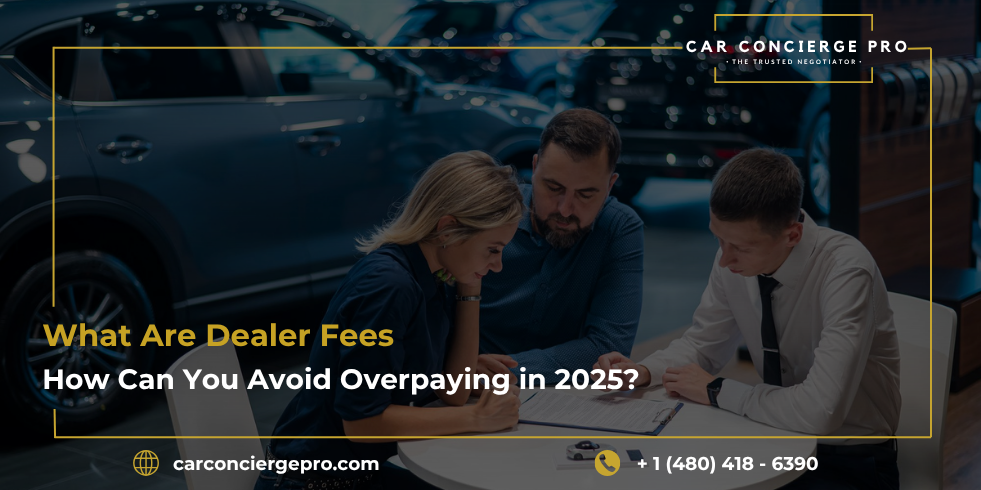Buying a car in 2025 feels smarter than ever — thanks to transparent online listings, digital financing, and real-time vehicle comparison tools. But one hidden factor still frustrates even the most informed car buyers: dealer fees.
These costs can quietly add hundreds or even thousands of dollars to your final bill, often leaving buyers wondering, “Where did all this come from?”
At Car Concierge Pro, we believe in full transparency — helping our clients identify, understand, and negotiate every hidden cost. Let’s break down everything you need to know about dealer fees in the new automotive era.
What Exactly Are Dealer Fees in 2025?
Dealer fees are extra charges that dealerships add to the vehicle’s sale price to cover administrative, preparation, or promotional costs. They vary widely by location, dealership, and brand, but the most common ones include:
- Documentation Fees: Covering paperwork like the title transfer, registration, and bill of sale.
- Destination Fees: The manufacturer’s cost to transport the vehicle from the factory to the dealership.
- Advertising Fees: Dealer-imposed costs for marketing campaigns or regional ads.
- Dealer Prep Fees: Charged for cleaning, inspection, or reconditioning before delivery.
- Sales Tax: A mandatory government fee based on your state’s tax rate.
While some fees are legitimate and unavoidable, others are purely dealer markups — negotiable and sometimes unnecessary.
Why Do Dealer Fees Still Exist in the Digital Car-Buying Age?
In 2025, many dealerships still rely on traditional revenue models. Dealer fees serve as a profit buffer for costs that aren’t easily visible to the buyer — such as logistics, marketing, and compliance.
However, digital-first platforms like Car Concierge Pro challenge this practice by ensuring:
- Every charge is disclosed before you sign anything.
- Negotiable fees are reduced or eliminated.
- The client receives an itemized cost breakdown upfront.
How Much Can Dealer Fees Add to the Cost of a Car?
Dealer fees can range from $500 to over $2,000, depending on where and what you buy.
For example:
- A Toyota RAV4 may include $995 in destination fees and $499 in doc fees.
- A luxury EV like a BMW i4 might add over $1,500 in delivery and processing costs.
When these fees are rolled into your financing plan, you also end up paying interest on them — making the real cost even higher.
How Do Dealer Fees Affect Your Buying Decision?
Dealer fees can change how you view a “good deal.”
Here’s how they impact your decision-making:
- Extra Costs: What looked like a $35,000 SUV can quickly reach $37,500 after add-ons.
- Negotiation Power: Knowing what each fee means gives you control during pricing discussions.
- Financing Impact: Fees get added to your loan balance, raising monthly payments.
- Comparing Deals: One dealer’s “no-haggle” price may actually include thousands in hidden charges.
That’s why Car Concierge Pro audits every dealership quote — revealing hidden fees before you commit.
Can You Negotiate or Remove Dealer Fees?
Yes, but it depends on the type of fee.
Fee Type | Negotiable? | Notes |
Documentation Fee | ❌ Often fixed by state law | Covers the cost of processing paperwork like title, registration, and sales documents. Usually non-negotiable, but can vary by state. |
Destination Fee | ❌ Set by manufacturer | This charge covers the cost of delivering the car from the factory to the dealership. It’s standard and non-negotiable. |
Dealer Prep Fee | ✅ Usually negotiable | Covers cleaning, inspections, and basic prep before delivery. You can often ask the dealer to waive or reduce it. |
Advertising Fee | ✅ Can often be waived | Dealers add this to cover local or regional advertising costs. Politely question or negotiate to remove it. |
Extended Warranty / Add-ons | ✅ Optional or removable | Includes extras like paint protection or service plans. Decline if unnecessary — dealers often mark these up. |
Pro Tip: Always negotiate the vehicle price first, then discuss dealer fees. Once you’ve secured a lower base price, dealerships are more open to cutting unnecessary extras.
How Can You Avoid Excessive Dealer Fees in 2025?
In today’s competitive market, smart car buyers use these strategies:
- Request a Full Breakdown: Ask for an itemized list of all fees before you agree to the deal.
- Shop Multiple Dealerships: Compare offers — many waive or reduce fees to earn your business.
- Look for “No Hidden Fee” Dealers: Some brands (like Tesla or Carvana) build fees into transparent pricing.
- Use a Car Concierge: Platforms like Car Concierge Pro handle all fee negotiations for you.
- Consider Buying Used or CPO Cars: These often have lower prep and advertising fees.
- Avoid Last-Minute Add-ons: Resist upsells like paint protection or VIN etching unless you truly need them.
What About Buying from Private Sellers or Online Platforms?
Buying directly from a private seller can eliminate many dealer fees — but it comes with its own risks:
- No warranty protection
- No quality assurance or inspection
- Complex paperwork
That’s why Car Concierge Pro offers buyer protection and verification tools, ensuring your purchase — whether new, used, or private — is secure, fair, and hassle-free.
How Does Car Concierge Pro Help You Save on Dealer Fees?
At Car Concierge Pro, transparency isn’t a feature — it’s a guarantee.
Our team of automotive experts:
- Reviews every dealership quote line-by-line.
- Identifies inflated or duplicate charges.
- Negotiates directly with the dealer on your behalf.
- Ensures your out-the-door price is the lowest possible.
With our tech-driven platform and expert negotiation team, we help clients save an average of $1,500–$3,000 per purchase.
Should You Expect New Kinds of Fees in 2026?
As the industry evolves, new fees are emerging — especially for EVs and subscription-based features.
You might encounter:
- Software activation fees (e.g., heated seat or autopilot subscriptions)
- Battery recycling or environmental fees
- Charging network access fees
Car Concierge Pro stays ahead of these changes — guiding clients on which fees are justified and which are simply dealer add-ons in disguise.
Final Thoughts: Why Understanding Dealer Fees Saves You Money in 2025–2026
Dealer fees can significantly impact your car purchase, but with the right knowledge and guidance, they don’t have to break the bank.
- Compare fees across dealerships.
- Negotiate removable fees.
- Use Car Concierge Pro to ensure transparency, save money, and streamline the buying process.
Your total out-the-door price is what matters most. Understanding dealer fees, negotiating what you can, and trusting a professional service like Car Concierge Pro will give you confidence, control, and savings.
Ready to buy your next car without hidden fees or stress? Let Car Concierge Pro handle the negotiation, paperwork, and research for you. Get your personalized quote today!
⭐Client Testimonial:
“Car Concierge Pro helped me save $1,200 by negotiating dealer fees and getting the exact out-the-door price upfront. Stress-free car buying!” – Priya M., Texas
“I didn’t know which fees were mandatory. CCP broke it down, saved me time and money, and made the process easy.” – Brian L., California







